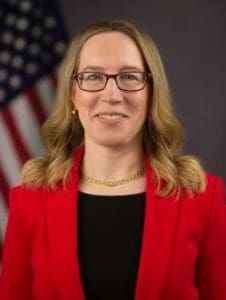Earlier this month Hester Peirce, a commissioner of the SEC, delivered a powerful speech in LA that bodes well for the future of cryptocurrency regulation. She addressed the challenges she faces as a regulator of the financial sector, and shared her own philosophy regarding initial coin offerings (ICOs).
Likening the role of a regulator to that of a lifeguard, Ms. Peirce described the role of the SEC as stepping in only when necessary, not watching the “sandcastle builder’s every decision.” She instead encouraged curiosity in the regulatory approach to ICOs, stating that the SEC “must put in the effort the learn about these new technologies.”
 Ms. Peirce lamented the fact that “most of the communications from the SEC on the topic have come from our Division of Enforcement,” expressing her hope that constructive a dialogue will open and create a more hospitable regulatory environment. Ideally an updated set of regulatory guidelines will come in the near future to account for the novel aspects of blockchain based tokens.
Ms. Peirce lamented the fact that “most of the communications from the SEC on the topic have come from our Division of Enforcement,” expressing her hope that constructive a dialogue will open and create a more hospitable regulatory environment. Ideally an updated set of regulatory guidelines will come in the near future to account for the novel aspects of blockchain based tokens.
Applying decades old rules written before the conceptualization of blockchain and the internet is inadequate for this new technology. I am encouraged, and so should project developers and market participants by Ms. Peirce’s thoughtful statements on the issue, as they portend a future of updated and effective regulatory policy, hopefully stamping out fraud while creating an environment for the technology to flourish.
Posing the question of how to “be a better lifeguard,” Ms. Peirce highlights the importance of viewing a token’s function when determining how to regulate ICOs. While cryptocurrencies can function like money or be viewed as a commodity, Peirce sees ICOs as most closely emulating securities.
Regarding ICO tokens Ms. Peirce highlighted that often “creator[s] sell them as a means of raising funds… before the environment is built.” So whether coins are used as a medium for exchange or as a way to track exchanges, the “proceeds from the sales of tokens are used to build the system in which they will one day function” which fundamentally changes their functionality from one of utility to that of a security.
Despite the logical conclusion that ICOs can function as securities Peirce cautions against “blanket designations for all ICOs” stating that “There is a risk, when something truly innovative comes along, that regulators will focus only on the harms the innovation may bring and entirely miss the opportunity it presents to improve people’s lives.”
 While Ms. Peirce’s statements are thoughtful and indicate she is willing to adapt to new challenges posed by the technology she is only one of five on the commission. Sitting chair, Jay Clayton, has stated on record that he is yet to see an ICO that does not fall under the category for securities. Mr. Clayton believes that there may be a true utility token that would fall under regulations distinct from securities, but that there is yet to be an ICO in accordance with the not yet established category.
While Ms. Peirce’s statements are thoughtful and indicate she is willing to adapt to new challenges posed by the technology she is only one of five on the commission. Sitting chair, Jay Clayton, has stated on record that he is yet to see an ICO that does not fall under the category for securities. Mr. Clayton believes that there may be a true utility token that would fall under regulations distinct from securities, but that there is yet to be an ICO in accordance with the not yet established category.
Even with the challenges the SEC faces regarding their ability to regulate this new asset class market participants should be optimistic. Ms. Peirce’s speech is the most promising to date from any regulator, highlighting the importance for the agency to “not let our lack of familiarity with the technology breed anxiety and therefore bad regulation.”
Ms. Peirce’s speech drew other regulators to the chorus of support for blockchain and digital assets, namely Chairman Chris Giancarlo of the Commodity Futures Trading Commission (CFTC).
On Twitter Mr. Giancarlo lauded the speech for its “superb thinking on token technology.” Hopefully, the Peirce and Giancarlo attitudes precipitate new thinking in the regulatory space among regulators.
The future of cryptocurrency regulation is bright, and market participants should expect positive steps towards facilitating innovation and eliminating fraud from the marketplace.
 Jim Borzilleri is President and founder of CrowdEngine, a white label crowdfunding software provider. Using CrowdEngine’s software platform, companies can legally raise money from the general public with all services licensed and operated by CrowdEngine but made available to you and your customers under your domain and branding. CrowdEngine also provides an Initial Coin Offering solution for regulatory compliant token sales. Borzilleri is a co-founding member of the Crowdfunding Professional Association (CfPA) and a software-as-a-service (SaaS) expert who brings over 20 years of business development and executive management experience to his role as President of CrowdEngine.
Jim Borzilleri is President and founder of CrowdEngine, a white label crowdfunding software provider. Using CrowdEngine’s software platform, companies can legally raise money from the general public with all services licensed and operated by CrowdEngine but made available to you and your customers under your domain and branding. CrowdEngine also provides an Initial Coin Offering solution for regulatory compliant token sales. Borzilleri is a co-founding member of the Crowdfunding Professional Association (CfPA) and a software-as-a-service (SaaS) expert who brings over 20 years of business development and executive management experience to his role as President of CrowdEngine.

